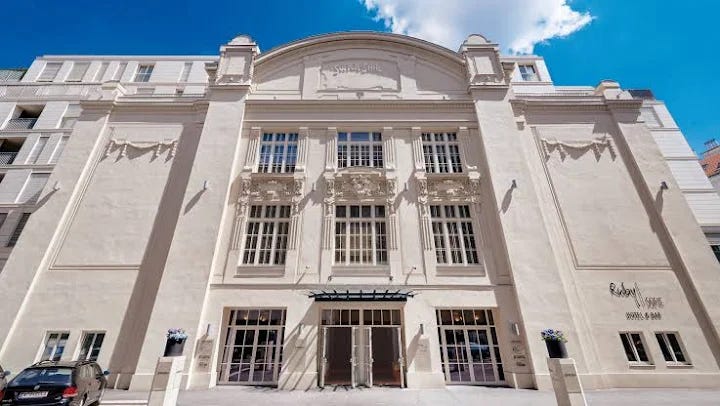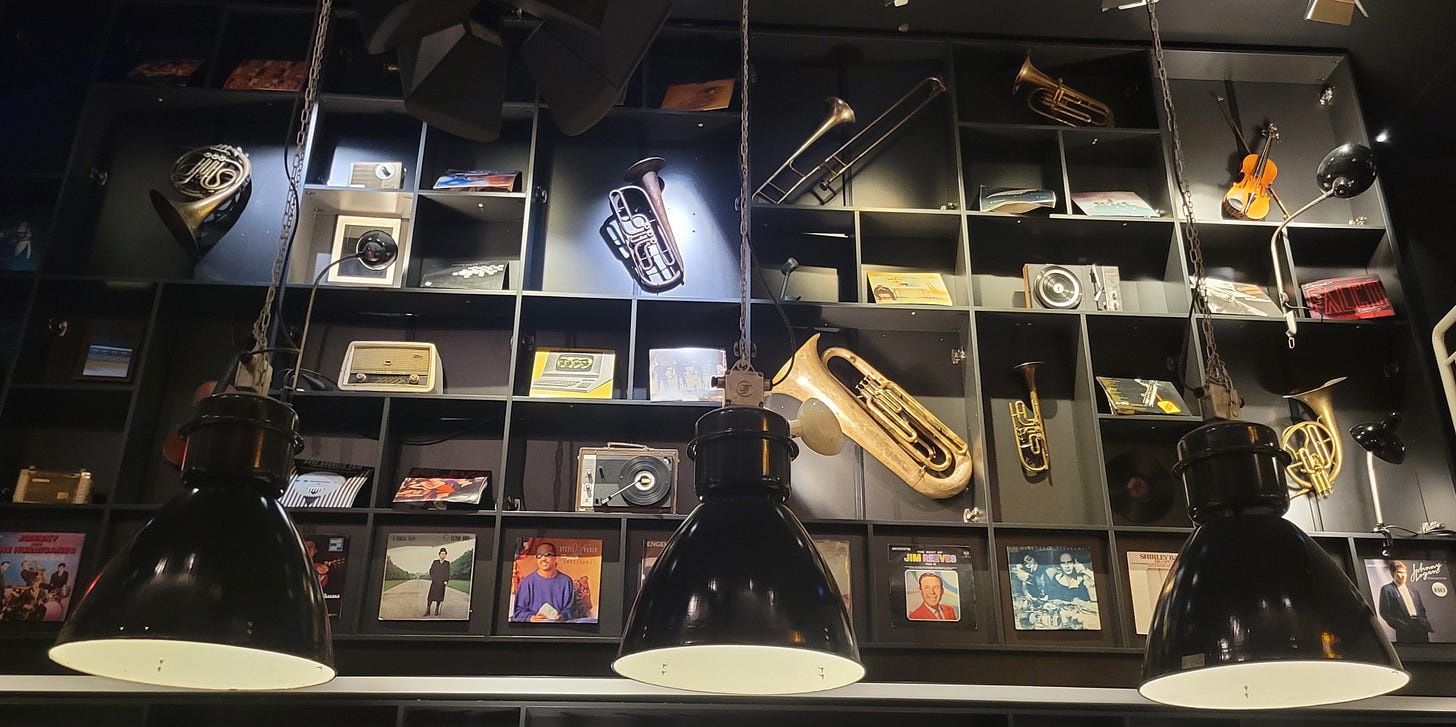CHAPTER 2: The Ruby Sofie
WELCOME TO VIENNA
We arrived in Vienna already confused. Not by customs, or signage, or even the language. Just by how smooth everything was. The train from the airport ran like it had something to prove. It glided. It whispered. It felt less like transit and more like being delivered.
We disembarked at Wien Mitte, the very station we’d been told was more or less adjacent to our hotel.
And then, with full luggage in tow and the map open on three phones, we did the most American thing imaginable: we called a taxi anyway.
It was instinct. Habit. A subtle kind of shame. Maybe we just needed someone else to take control for a few minutes, even if it meant paying €28 to be driven four blocks.
The driver didn’t laugh. He just nodded, drove us in a slow, polite circle, and dropped us off in front of a building so understated we almost missed it.
Ruby | Sofie
HOTEL & BAR
At first glance, the hotel doesn’t scream much. Low signage. A name in a font that looks like a jazz singer’s Tinder bio. But there’s something about the building’s posture—quiet, collected, not trying to impress you—that lets you know it doesn’t have to.
This place knows what it is.
Before it was a hotel, it was history: built in 1838 as a Russian steam bath. Later, it became Vienna’s legendary Sofiensäle concert hall. Strauss conducted here. So did Mahler. Falco shouted something strange here in the '80s. It burned down in 2001 and was reborn as a boutique hotel with punk rock manners and operatic blood in its walls.
We entered the building and walked up the stairs to the hotel bar that also functioned as guest check-in. The place smelled like espresso and soft wood. Old concert posters and Edison bulbs hovered above modern furniture like the past and future were in negotiation. It was the kind of place where even the shadows felt curated.
And that’s when we met Jules.
She was behind the front desk, typing something briskly and correcting a printed receipt without looking up. Long brown hair. All black attire—same as the rest of the staff, but on her it looked like it might have come with a concealed blade and a witty exit line. She couldn’t have been older than her early 30s, but she had that fully-formed presence that says: I’m not just the supervisor. I’m the one who knows where the bodies are buried, alphabetized, and composted.
She looked up, clocked our faces, and smiled with surgical precision.
“Let me guess,” she said. “You took a taxi here from the train.”
There was a beat of silence as we tried to figure out how she knew.
Then she arched an eyebrow and added:
“Classic. Happens every day. Welcome to Vienna, you’re only the fifth today.”
Lukáš, somehow, had the only room available for early check-in because of course he did. His luck exists in a category scientists haven’t named yet.
As she checked him in, Jules casually explained the layout of the building with the exact tone of someone who has done this so many times she’s begun to enjoy treating it like performance art.
“Your room’s on the fifth floor. Soundproof, unless the ghost of Mozart decides to practice. The bar is open 24 hours a day. Yes, really. And the elevator works. Mostly.”
She handed Lukáš the keycard like she was handing him a contract.
“Try not to die, or at least don’t do it in the hallway. Bad for the vibe.”
We all took the elevator up together. Fifth floor. The hallway felt like the backstage wing of a music venue that also happened to offer king-size beds. His room was sleek, stripped down, designed by someone who believed beauty starts where clutter ends. We dropped our luggage. Nobody said much. We just stood on the balcony, staring across the street at an office building like three ghosts catching their breath.
It was silent. Eerily so.
Eventually, we went back down to the bar. We needed a reset.
By now the breakfast crowd had cleared out, and Jules was back behind the bar—not behind the desk, the bar, wiping surfaces and talking with the kitchen crew like someone who could bark orders or pour an espresso martini with the same fluid motion.
The bar wall was absurd. A shrine consisting of vinyl records, brass instruments, cameras, radios, and sheet music.
It looked like a Cold War surveillance unit had been reimagined by Wes Anderson and then turned into a jazz club.
We sat down. Ordered beer. Jules was mid-laugh with a colleague but caught our eyes and called across the room:
“Still jet-lagged? You look like you time-traveled and lost.”
We nodded. She poured two tall glasses like she was performing triage.
That’s when the plan hit us. Mid-beer. No nap. No food. Just instinct and compulsion and the smell of citrus-scented cleaner and fresh hops.
“We should go to St. Stephen’s,” someone said. “Now.”
Jules laughed. “Oh, jumping right into the collapse of Western Christendom. Bold move.”
We toasted to that.
Clinked our glasses.
And the story—this story—started walking.






Nice! Thoroughly enjoyed reading that!
Now I've just got to visit a certain hotel in Vienna....